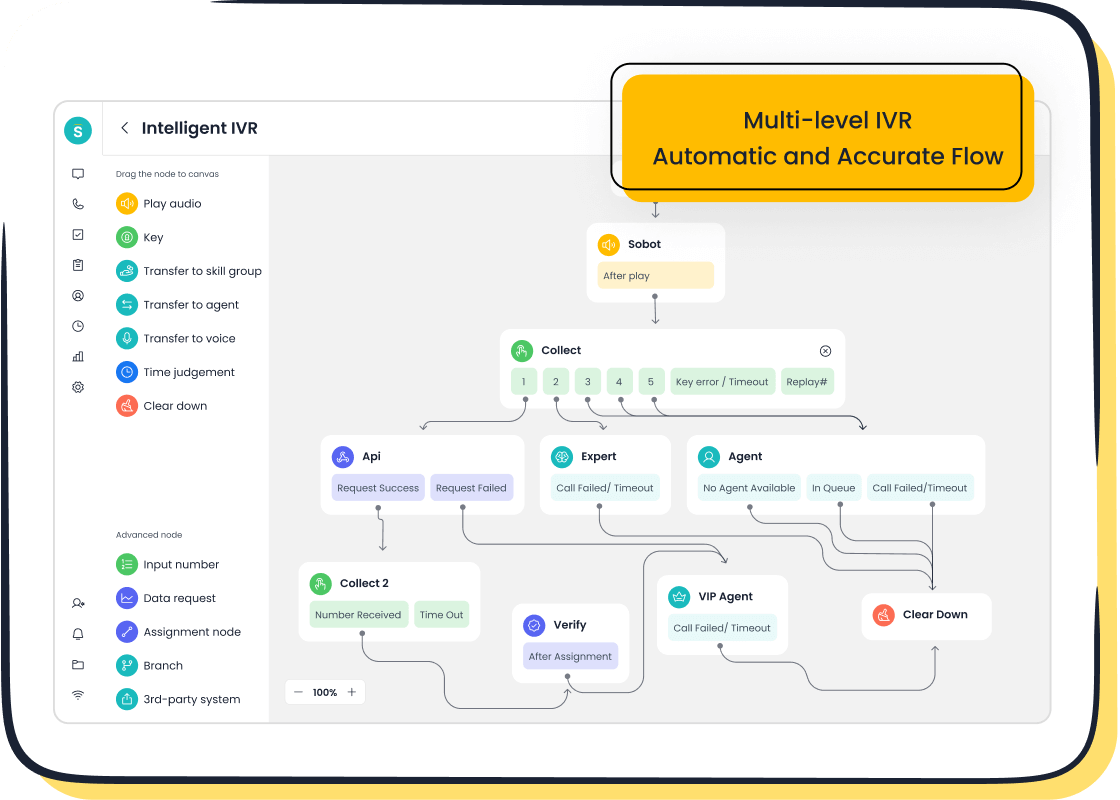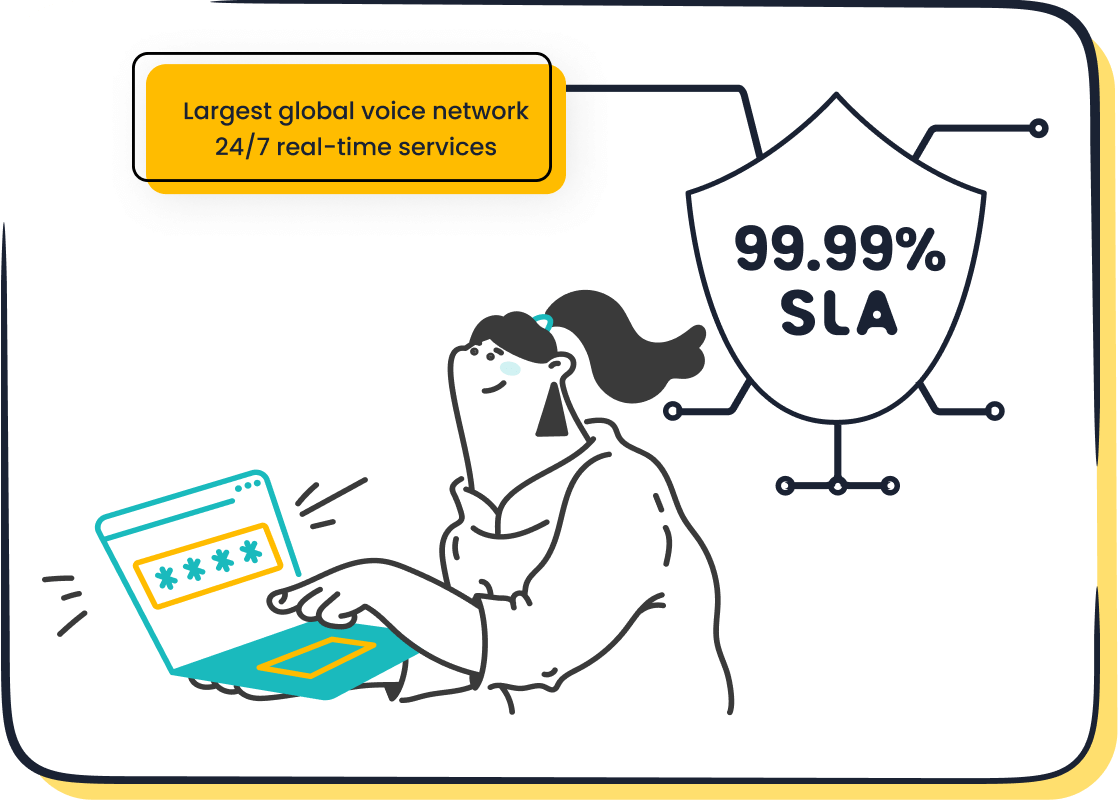Ensuring Compliance in Telemarketing Call Centers in 2025

Compliance is the backbone of a successful telemarketing call center for sale. It protects your business from legal risks and strengthens the trust customers place in your company. By following regulations like the Telephone Consumer Protection Act (TCPA), you avoid penalties and safeguard your reputation. Adhering to these rules also shows respect for customer privacy and time, which fosters loyalty and long-term relationships.

The importance of compliance extends beyond avoiding fines. It positions your call center as a responsible and ethical player in the industry. In 2025, stricter regulations demand innovative solutions, like Sobot’s advanced Voice/Call Center, to ensure smooth operations. These tools help you stay ahead, turning compliance into a competitive advantage.
📈 Businesses that prioritize compliance often outperform competitors by building trust and delivering responsible marketing practices.
What is Call Center Compliance?
Definition and scope of compliance in telemarketing
Call center compliance refers to adhering to the laws, regulations, and ethical standards that govern telemarketing operations. These rules cover critical areas such as data protection, consumer rights, and ethical practices. For example, compliance ensures that sensitive customer information, like financial or health data, is handled securely and ethically. It also includes gaining proper consent for call recordings and respecting customer preferences regarding contact times.
In 2025, compliance has become more comprehensive. Telemarketing call centers must now follow stricter global standards, such as the Telephone Consumer Protection Act (TCPA) and the Payment Card Industry Data Security Standard (PCI DSS). These regulations aim to protect consumer privacy and prevent fraud. By implementing compliance practices like call monitoring, agent training, and advanced technology, you can ensure your call center operates within legal boundaries while maintaining high ethical standards.
📊 Did you know? 73% of contact center leaders plan to increase their budgets in 2025 to enhance compliance and operational efficiency.
Why compliance is essential for telemarketing call centers
Compliance is not just a legal requirement; it is a business necessity. It protects your call center from hefty fines, legal battles, and reputational damage. For instance, failing to comply with TCPA regulations can result in penalties of up to $1,500 per violation. Beyond legal risks, non-compliance can erode customer trust, which is vital for long-term success.
Operational efficiency also improves with compliance. Automated tools, like Sobot’s Voice/Call Center, can flag potential non-compliance issues in real-time. This ensures that every interaction aligns with legal standards, reducing errors and enhancing productivity. Monitoring calls and maintaining quality assurance further help you meet regulatory requirements while delivering exceptional service.
✅ Tip: Investing in compliance tools not only safeguards your business but also boosts customer satisfaction by demonstrating your commitment to consumer protection.
Ethical and operational benefits of compliance
Operating a compliant call center offers numerous ethical and operational advantages. Ethically, it ensures that customer data is handled responsibly, fostering trust and loyalty. For example, compliance with HIPAA protects sensitive health information, while PCI DSS safeguards financial data. These practices show your customers that you value their privacy and security.
Operationally, compliance streamlines processes and reduces costs. Regular compliance checks help you avoid penalties and maintain audit readiness. Training agents on compliance protocols ensures consistent service, which builds a positive reputation for your brand. Tools like Sobot’s AI-powered Voicebot can automate compliance tasks, such as redacting sensitive information during calls, further enhancing efficiency.
| Benefit | Description |
|---|---|
| Audit readiness | Compliance ensures your team is always prepared for audits with documented quality assurance. |
| Avoiding penalties | Regular checks help you avoid costly fines for regulatory violations. |
| Building trust | Ethical practices build stronger relationships with customers. |
| Reduced operational costs | Compliance minimizes risks and improves efficiency, saving money in the long run. |
By prioritizing compliance, you not only protect your business but also create a competitive edge. Customers are more likely to choose a call center that respects their rights and delivers consistent, ethical service.
Key Telemarketing Sales Rules and Regulations

Overview of the Telemarketing Sales Rule (TSR)
The telemarketing sales rule is a cornerstone of telemarketing compliance. It establishes clear guidelines for how you can interact with customers over the phone. The TSR requires you to disclose key information during calls, such as the identity of your business and the purpose of the call. It also prohibits deceptive practices, like misrepresenting products or services.
One critical aspect of TSR compliance is the national do not call registry. This registry allows consumers to opt out of receiving telemarketing calls. As a telemarketer, you must regularly update your call lists to exclude these numbers. Violating this rule can lead to severe penalties, including fines of up to $43,792 per violation. By adhering to the telemarketing sales rule, you not only avoid legal risks but also demonstrate respect for consumer preferences.

Sobot’s Voice/Call Center can simplify TSR compliance. Its smart call routing and automated workflows ensure that your agents only contact eligible leads. This reduces errors and keeps your operations aligned with the law.
Understanding the Telephone Consumer Protection Act (TCPA)
The telephone consumer protection act is another critical regulation for telemarketing. It governs how you can use automated dialing systems, prerecorded messages, and text messages. TCPA compliance requires you to obtain explicit consent from customers before contacting them through these methods.
Failing to comply with TCPA can result in hefty penalties. Legal fines range from $500 to $1,500 per violation. For example, Dish Network faced a $280 million penalty in 2017 for TCPA violations. These figures highlight the importance of staying compliant. Tools like Sobot’s AI-powered Voicebot can help you manage consent records and monitor calls for compliance, reducing your risk of violations.
State-specific regulations and their impact on call centers
In addition to federal laws and regulations, many states have their own telemarketing rules. These can include stricter limits on call times, additional consent requirements, or higher penalties for violations. For example, Florida’s telemarketing laws impose fines of up to $10,000 per violation.

Staying compliant with state-specific regulations can be challenging, especially if your call center operates across multiple states. Sobot’s Voice/Call Center offers features like time zone support and call tracking, making it easier to manage compliance across different jurisdictions. By leveraging these tools, you can ensure that your operations meet both federal and state requirements.
Risks and Consequences of Non-Compliance
Legal penalties and fines for violating telemarketing rules
Non-compliance with telemarketing regulations can lead to severe financial repercussions. Violating the Telephone Consumer Protection Act (TCPA) alone can result in fines ranging from $500 to $1,500 per violation. For large-scale campaigns, these penalties can quickly escalate into millions. For instance, a company faced a class-action lawsuit in 2019, resulting in millions of dollars in damages awarded to affected consumers. Additionally, under the Telemarketing Sales Rule (TSR), civil penalties can reach up to $43,280 per illegal call.
| Case Study | Violation Type | Fine Amount |
|---|---|---|
| FTC v. James B. Christiano | Providing support to illegal robocallers | Suspended $1 million |
| FTC v. Educare | Assisting known violators of TSR | Ongoing pursuit for restitution and disgorgement |
| TCPA Violations | Calling without permission | $500 to $1,500 per incident, potentially millions in total fines for large campaigns |
These examples highlight the financial risks of non-compliance. By leveraging tools like Sobot’s Voice/Call Center, you can monitor calls in real-time and ensure adherence to regulations, reducing the likelihood of costly violations.
Reputational damage and loss of customer trust
The impact of non-compliance extends beyond financial penalties. Negative publicity from regulatory breaches can tarnish your brand’s reputation. Customers lose trust when they feel their privacy or rights have been violated. This dissatisfaction often leads to complaints, negative reviews, and a decline in loyalty.
For example, a data breach or unauthorized call can make customers question your commitment to ethical practices. Once trust is broken, rebuilding it becomes a long and costly process. Sobot’s AI-powered Voicebot can help you avoid such scenarios by automating compliance tasks, ensuring every interaction respects customer rights and preferences.
🛡️ Pro Tip: Protect your reputation by prioritizing compliance. Customers value businesses that respect their privacy and deliver ethical services.
Operational disruptions and financial implications
Non-compliance doesn’t just hurt your wallet; it disrupts your operations. Regulatory investigations and audits can halt your business activities, causing inefficiencies and delays. For instance, GDPR fines can reach up to €20 million or 4% of global revenue, severely impacting profitability.
Operational disruptions also arise from the need to address compliance failures, such as retraining staff or overhauling processes. These interruptions divert resources from core activities, affecting productivity. Sobot’s Voice/Call Center minimizes these risks by providing features like call tracking and compliance monitoring, ensuring your operations run smoothly and within legal boundaries.
📊 Fact: Companies that invest in compliance tools experience fewer disruptions and maintain higher operational efficiency.
Strategies for Ensuring Compliance in Telemarketing Call Centers
Obtaining proper customer consent and maintaining records
Obtaining customer consent is a cornerstone of call center compliance. Regulations like the Telephone Consumer Protection Act (TCPA) and GDPR require you to secure explicit consent before initiating marketing communications or recording calls. This ensures that your operations respect consumer privacy and avoid hefty penalties. For example, TCPA violations can cost up to $1,500 per incident, making compliance a financial necessity.
To meet these requirements, you should clearly inform customers at the start of every call if it will be recorded. Explain the purpose of the recording and provide an option to opt out. Using pre-recorded messages for this purpose can streamline the process while ensuring transparency. Additionally, maintaining accurate records of consent is essential. Whether it’s written, verbal, or implied consent, you must document it thoroughly to demonstrate compliance during audits or legal challenges.
🛡️ Pro Tip: Use tools like Sobot’s Voice/Call Center to automate consent tracking. Its call recording and transcription features ensure you maintain detailed records, reducing the risk of non-compliance.
Training agents on compliance protocols and best practices
Your agents are the frontline of your call center. Their understanding of compliance protocols directly impacts your ability to meet regulatory standards. Effective training ensures that your team knows how to handle sensitive customer data, follow legal guidelines, and deliver ethical service.
Start by developing a comprehensive compliance checklist. Include key regulations like the Fair Debt Collection Practices Act, GDPR, and HIPAA. During onboarding, provide engaging training sessions that cover these rules in detail. Use real-world scenarios to help agents understand the importance of compliance. Ongoing training is equally important. Regular updates on regulatory changes keep your team informed and prepared.
📊 Fact: Companies that invest in ongoing training for compliance see a 25% reduction in regulatory violations.
Sobot’s AI-powered Voicebot can assist in this area by providing real-time coaching during calls. It flags potential compliance issues and offers corrective suggestions, ensuring your agents stay on track. Additionally, Sobot’s unified workspace simplifies access to compliance resources, making it easier for agents to follow best practices.

Leveraging Sobot's Voice/Call Center for compliance monitoring
Technology plays a vital role in ensuring call center compliance. Sobot’s Voice/Call Center offers advanced features designed to help you monitor and manage compliance effectively. Its real-time call tracking and monitoring capabilities allow you to identify and address potential issues as they arise. This proactive approach minimizes risks and ensures your operations align with legal standards.
The platform’s intelligent IVR system can automate compliance tasks, such as informing customers about call recordings and obtaining consent. Its AI-powered Voicebot enhances compliance monitoring by analyzing conversations for regulatory adherence. For example, it can detect when agents deviate from approved scripts or fail to disclose required information. These insights enable you to take corrective action immediately.
✅ Tip: Sobot’s compliance monitoring tools not only protect your business but also improve customer satisfaction by ensuring ethical and transparent interactions.
By leveraging Sobot’s Voice/Call Center, you can turn compliance into a competitive advantage. Its robust features simplify the complexities of call center compliance, allowing you to focus on delivering exceptional service.
Regular audits and updates to align with changing regulations.
Staying ahead in telemarketing requires you to adapt to ever-changing regulations. Regular audits and updates are essential for maintaining call center compliance and avoiding costly mistakes. These practices ensure your operations align with the latest legal standards, protecting your business from penalties and reputational damage.
Why Regular Audits Matter
Audits act as a health check for your compliance framework. They help you identify gaps, assess risks, and implement corrective measures before issues escalate. Conducting audits at least once a year or whenever telemarketing laws change keeps your call center compliant and efficient. For example, if new TCPA guidelines emerge, an audit ensures your processes meet updated requirements. Neglecting this step can lead to violations that disrupt operations and erode customer trust.
📊 Fact: Businesses that perform annual compliance audits reduce regulatory violations by 30%, according to industry studies.
How Updates Keep You Ahead
Regulatory updates often introduce new rules that impact telemarketing practices. Staying informed allows you to adjust your operations proactively. For instance, changes to state-specific laws might require you to modify call times or consent protocols. By updating your systems and training agents, you ensure seamless compliance across jurisdictions.

Sobot’s Voice/Call Center simplifies this process. Its real-time monitoring and AI-powered insights help you track regulatory changes and implement updates effortlessly. Features like call tracking and intelligent IVR ensure your workflows remain compliant, even as laws evolve.
Best Practices for Audits and Updates
To streamline audits and updates, follow these best practices:
- Schedule Regular Audits: Conduct compliance reviews annually or when laws change. This helps you stay ahead of potential risks.
- Leverage Technology: Use tools like Sobot’s Voice/Call Center to automate compliance checks and monitor call data.
- Train Your Team: Update agent training programs to reflect new regulations. This ensures consistent adherence to legal standards.
- Document Everything: Maintain detailed records of audits and updates. These documents demonstrate your commitment to compliance during inspections.
✅ Tip: Automate audit reminders with Sobot’s unified workspace to ensure timely reviews and updates.
By prioritizing audits and updates, you transform compliance into a competitive advantage. Customers trust businesses that respect their rights and deliver ethical service. Regular reviews not only protect your operations but also enhance your reputation in the telemarketing industry.
Future Trends and Challenges in Telemarketing Compliance

The role of AI and automation in ensuring compliance
AI and automation are transforming how you manage compliance in telemarketing. These technologies simplify complex processes, reduce human error, and ensure adherence to regulations. AI-powered systems monitor calls in real time, flagging deviations from compliance protocols instantly. Automation handles repetitive tasks like consent tracking and call list updates, freeing your team to focus on delivering exceptional service.

For example, Sobot’s Voice/Call Center uses AI to analyze conversations for compliance violations. It detects when agents fail to disclose required information or deviate from approved scripts. This proactive approach minimizes risks and enhances accuracy. By leveraging AI, you can streamline compliance checks and reduce administrative burdens, ensuring your operations remain efficient and legally sound.
💡 Note: AI-driven compliance tools not only protect your business but also improve customer satisfaction by ensuring ethical and transparent interactions.
Evolving customer expectations and privacy concerns
Customer expectations are shifting rapidly. Today’s consumers demand well-informed support representatives and greater transparency in how their data is used. According to recent studies, 71% of B2C customers and 86% of B2B clients expect agents to provide accurate, timely information during interactions. Privacy concerns are also rising, with stricter regulations requiring you to handle consumer data responsibly.
To meet these expectations, you must adopt tools that prioritize compliance and privacy. Sobot’s Voice/Call Center offers features like encrypted data transfer and GDPR compliance, ensuring customer information remains secure. Additionally, its AI-powered Voicebot helps agents deliver consistent, informed responses, building trust and loyalty.
📊 Fact: Companies that prioritize privacy and compliance see fewer complaints and lawsuits, strengthening their reputation in the market.
| Customer Type | Expectation of Well-Informed Support Reps |
|---|---|
| B2C | 71% |
| B2B | 86% |
Preparing for stricter global compliance standards in 2025
Global compliance standards are becoming more stringent. New regulations, such as the FCC’s rules on robocalls and the TCPA One-to-One Consent Rule, demand explicit consent for each seller. State-level laws in California and Florida are introducing higher penalties for violations. Transparency in AI compliance is also gaining importance, with organizations required to disclose how their algorithms function.

Sobot’s Voice/Call Center helps you navigate these challenges. Its intelligent IVR system automates consent collection, ensuring compliance with evolving rules. Real-time monitoring and AI insights keep your operations aligned with legal standards, even as regulations change. By staying proactive, you can adapt to stricter requirements and maintain a competitive edge.
🛡️ Pro Tip: Regular audits and updates to your compliance framework will prepare you for the regulatory shifts ahead.
Compliance is the foundation of success for telemarketing call centers. It protects your business from legal risks, builds customer trust, and ensures ethical operations. Non-compliance, on the other hand, leads to penalties, reputational damage, and operational disruptions. Proactive strategies, such as regular audits and leveraging data analytics, improve performance and foster accountability. For example, audits systematically evaluate calls to identify strengths and weaknesses, while analytics provide insights into agent performance and customer satisfaction.
Sobot’s Voice/Call Center simplifies compliance management with features like real-time monitoring, intelligent IVR, and AI-powered insights. These tools help you adapt to changing regulations and maintain seamless operations. By prioritizing compliance, you safeguard your business and deliver exceptional service. Take action today to turn compliance into your competitive advantage. Visit Sobot to explore solutions tailored for your call center needs.
FAQ
What is the best way to ensure compliance in telemarketing call centers?
The best way is to use advanced tools like Sobot’s Voice/Call Center. It automates compliance tasks, monitors calls in real-time, and ensures adherence to regulations like TCPA. For example, its intelligent IVR system collects customer consent seamlessly, reducing risks and improving efficiency.
💡 Tip: Regularly train your agents on compliance protocols to stay ahead of regulatory changes.
How can I avoid penalties for non-compliance?
You can avoid penalties by maintaining accurate records, obtaining proper customer consent, and using compliance-focused technology. Sobot’s AI-powered Voicebot flags potential violations during calls, helping you correct issues instantly. This proactive approach minimizes risks and ensures smooth operations.
✅ Fact: Businesses using compliance tools reduce violations by up to 30%.
Why is call recording important for compliance?
Call recording provides proof of compliance during audits or disputes. It ensures transparency and accountability. Sobot’s Voice/Call Center offers secure call recording and transcription features, making it easy to document interactions and meet legal requirements.
🛡️ Pro Tip: Always inform customers before recording calls to build trust and avoid legal issues.
How does Sobot help with state-specific telemarketing regulations?
Sobot’s Voice/Call Center simplifies compliance with state laws by offering features like time zone support and call tracking. These tools ensure your agents follow local rules, such as restricted call times or consent requirements, across multiple jurisdictions.
📊 Example: Florida’s telemarketing laws impose fines of up to $10,000 per violation. Sobot helps you avoid these costly mistakes.
What are the benefits of using AI for compliance?
AI reduces human error, automates repetitive tasks, and ensures real-time monitoring. Sobot’s AI-powered Voicebot analyzes conversations for compliance violations, flags issues, and provides corrective suggestions. This boosts efficiency and protects your business from legal risks.
💡 Note: AI-driven compliance tools improve customer satisfaction by ensuring ethical interactions.
See Also
Essential Strategies for Effective Call Center Quality Management
Comprehensive Review of Leading Contact Center Solutions for 2024
Understanding Quality Management Systems in Call Centers
A Ten-Step Approach to Omnichannel Contact Center Implementation
Best Cloud-Based Contact Center Solutions to Consider in 2024
